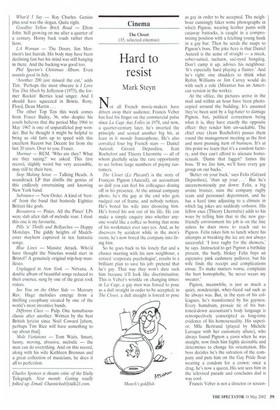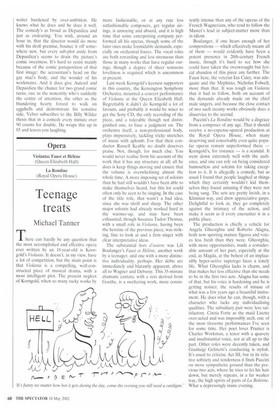Hard to resist
Mark Steyn
Not all French movie-makers have Orivcn away their audience. Francis Veber has had his finger on the commercial pulse since La Cage Aux Folles in 1978, and now, a quarter-century later, he's inverted the principle and scored another big hit, at least in le monde francophone. He's also corralled four big French stars — Daniel Auteuil, Gerard Depardieu, Jean Rochethrt and Thierry Lhermitte — all of whom gleefully seize the rare opportunity to act before large numbers of paying customers.
The Closet (Le Placard) is the story of Francois Pignon (Auteuil), an accountant so dull you can feel his colleagues dozing off in his presence. At the annual company photo, he's the guy at the end who gets nudged out of frame, and nobody notices. He's bored his wife into divorcing him. He's bored his son out of his life. He can make a simple enquiry into whether anyone would like a coffee so boring that none of his workmates ever says yes. And, as he discovers by accident while in the men's room, he's now bored the company into firing him.
So he goes back to his lonely flat and a chance meeting with his new neighbour, a retired `corporate psychologist', results in a brilliant plan to save his job: pretend that he's gay. That way they won't dare sack him because it'll look like discrimination. This is Veber's wrinkle on changing times: in La Cage, a gay man was forced to pose as a dull straight in order to be accepted; in The Closet, a dull straight is forced to pose as gay in order to be accepted. The neighbour cunningly fakes some photographs in which Pignon, wearing leather pants with cutaway buttocks, is caught in a compromising position with a fetching young hunk in a gay bar. Then he sends the snaps to Pignon's boss. The joke here is that Daniel Auteuil is the acme of straight — a meek, sober-suited, taciturn, sad-eyed hangdog. Don't camp it up, advises his neighbour. 'It's especially hard playing a flamer.' And he's right: one shudders to think what Robin Williams or Jim Carrey would do with such a role (Miramax has an American version in the works).
At the office, the pictures arrive in the mail and within an hour have been photocopied around the building. It's assumed they've been sent by a fag-hater to damage Pignon, but, political correctness being what it is, they have exactly the opposite effect: they render him un-sackable. The chief exec (Jean Rochefort) passes them round the management meeting as the first and most pressing item of business. It's at this point we learn that it's a condom factory, and they can't afford to alienate homosexuals. 'Damn that faggot?' fumes the boss. 'If we fire him, we'll have every gay group on our backs.'
'Better on your back.' says Felix (Gerard Depardieu), 'than up your. ... ' But he's unceremoniously put down: Felix, a big ursine bruiser, runs the company rugby team and personnel department, and he has a hard time adjusting to a climate in which fag jokes are suddenly verboten. His fellow exec (Thierry Lhermitte) adds to his woes by telling him that in the new gayfriendly environment his job is on the line unless he does more to reach out to Pignon. Felix takes him to lunch where his attempts at breaking the ice are not always successful: 'I love rugby for the showers,' he says. Instructed to get Pignon a birthday present, the burly, blokey Felix buys an expensive pink cashmere pullover, but his wife finds the receipt and complications ensue. To make matters worse, complains the hurt homophobe, 'he never wears my sweater.'
Pignon, meanwhile, is justas much a quiet, nondescript, whey-faced sad sack as he always was. But, in the eyes of his colleagues, he's transformed by his gayness. Every humdrum, prosaic tic of his buttoned-down accountant's body language is retrospectively conscripted as long-time evidence of his homosexuality. His superior, Mlle Bertrand (played by Michele Laroque with her customary allure), who always found Pignon a yawn when he was straight, now finds him highly desirable and determines to change his orientation. His boss decides he's the salvation of the company and puts him on the Gay Pride float wearing a condom for a crown: once a drag, he's now a queen. His son sees him in the televised parade and concludes dad is way cool.
Francis Veber is not a director or screen writer burdened by over-ambition. He knows what he does and he does it well. The comedy's as broad as Depardieu and just as endearing. You wish, around an hour in, that the director would do more with his droll premise, bounce it off somewhere new, but every sub-plot aside from Depardieu's seems to drain the picture's comic sweetness. It's hard to resist mainly because of the comic juxtaposition of that first image: the accountant's head on the gay stud's body, and the wonder of his workmates. And it does give Auteuil and Depardieu the chance for two grand comic turns, one as the nonentity who's suddenly the centre of attention, the other as the blundering hearty forced to walk on eggshells and demonstrate his sensitive side. Veber subscribes to the Billy Wilder thesis that in a comedy every minute over 90 counts for double. He wraps this up in 85 and leaves you laughing.















































































 Previous page
Previous page